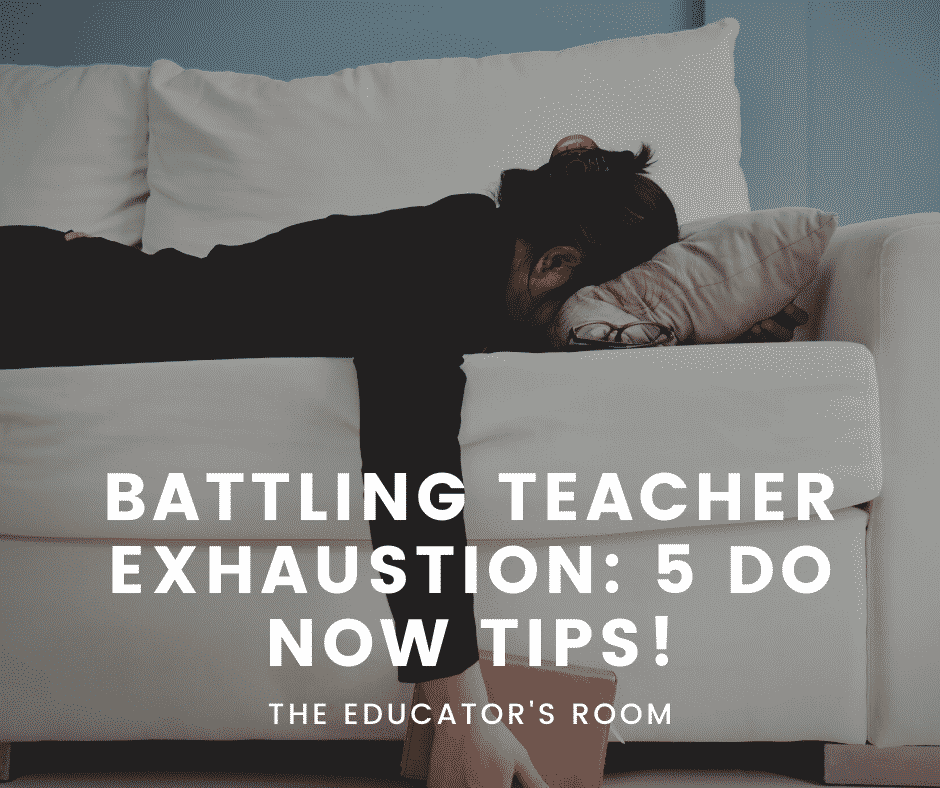Every teacher comes into the profession ready to change the world one life at a time. Every teacher also learns quickly that changing the world is exhausting.
10 years ago, my buddy gave me a ride home from work. As I stumbled out of his car holding what looked like a metric ton of stuff, he asked, “What’s that?”
I replied, “I’ve got a little work tonight.”
He shook his head and reminded me that it was Friday, and ever since, I’ve been battling the pressure that pushes teachers to behave like workaholics, and feel exhausted. Below are 5 tips, I’ve found helpful in giving me just a little more time, energy and patience for the loved ones I come home to each day.
#1- Maintaining Sanity While Grading
All teachers have had the frustration of grading a stack of papers, finding themselves writing the same comment over and over again. Here’s your new rule: if you’ve written the same exact comment 3 times in 5 papers, stop. Take a picture of the work. Make a copy. Type it into your PowerPoint, but whatever you do, do not write that comment again. The time you take to prep and show this error to your classes is going to reduce your anxiety from writing the same comment 50 times and asking yourself, “What is wrong with these kids?!” Not to mention, it will save you time.
Furthermore, taking the time to bring it up to your whole class benefits everyone. Students can ask a question. They can see specifically what you would have preferred. You get to gauge their receptiveness to the correction and learn whether or not you have a more serious problem on your hands.
#2- Virtual Teaching Overload
Setting up those classroom social media accounts, online webinars, YouTube seminars…stop it all. You are overworked, and your kids are busy too. Just like you can only tolerate so much PD, your students too must have time to decompress and absorb their learning. It can’t be constant stimulation all the time.
Focus on maximizing the class time you have by using your time away from class to recharge. Your responsibility is to be fully invested for the 40-90 minutes your students are in front of you each day. When they are there, give them everything you can, but once the day is done, you have to breath, reflect, and relax. You can’t do that if you are trying to be a virtual teacher too.
#3- Contacting Home Done With Urgency
It’s the end of class and Little Johnny has been a terror. He refused to sit down, stop talking, take out a pencil, stop throwing paper airplanes everywhere, and he spilled his water bottle while also managing to poke half the class.
You’ve tried every tactic you can to get to the root of the problem. What’s wrong? How was your day? Did something happen in art? How are things at home? You’ve written positive notes, given him step-by-step instructions, conferenced with him before, during and after class, talked with mom via email and the phone. But, nothing. So, now you are threatening to call home again.
Stop with the threats. Just do it. Right there, with students walking out to their next class, pull the number up and call. If you’ve got a free period afterwards, it’s great. But, if not, do it anyways. First, it’s a great excuse to avoid hall duty. Second, the kid gets to be privy to the conversation, so all parties know exactly the message being sent between home and school. Third, you don’t have to add another task to your “to do” list. Fourth, you’ve got a bunch of legit excuses to cut the conversation short if it starts to drag: coverage, hall duty, teaching a class, meeting with the principal, etc.
I’ve taken to this tactic lately, and I make the kid talk to their parents about what has gone on. They don’t like having to explain what they did in class, and their parents take it even more seriously hearing it from their kid. I don’t have to tell parents how upset and frustrated I am; they know.
#4- A New Email Attitude
Have you ever had an emergency? How many times have you sent an email to solve such a problem? The correct answer is zero.
Email is meant as a convenience, not a lifeline. Remember, if someone needs your immediate attention as a teacher, they can find you. Your schedule is likely displayed on the wall of your administrator’s office. If someone needs you, they can walk the 15 steps to your classroom door. They send an email because it’s not urgent.
So, stop checking your email like it’s an emergency. Take your email off your phone.
One morning I was walking into work with a colleague, and I asked if he’d seen the email I sent the night before. He said, “No.” I explained the issue at hand, and he asked a follow up question, “Why didn’t you just tell me this morning?” He was right because even if he had responded to my email the solution couldn’t have been implemented until we were at school anyhow.
Additionally, if Little Johnny is emailing you expecting an immediate response, well, email isn’t for emergencies. Some lessons are best taught sooner as opposed to later.
#5- Bringing Back Faith in Humanity
Every day teachers see over 100 students. Most of them are pretty good souls. But, when we walk out that door, it’s Little Johnny that we walk out remembering. He’s exhausted our last ounce of patience and strength, and we bring him home with us too. Stop letting that happen.
Get a stack of index cards.
On your way out of school, take 2 minutes and think of one of those good souls. The kid you never have to remind to sit down or stop talking or stop yelling at people. The kid who just does what you ask, or at least doesn’t do the opposite. Write them a note. Thank them for working hard. Tell them you appreciate having them in class. Wish them a great day. Leave it on your desk and head for home with Little Johnny pushed a little further into the back of your mind.
Think of it like a tweet to end your day. Everyone’s got time to send a tweet.
The next morning it will greet you too. It’ll be a reminder about why you got into this job in the first place.
Now, I hope you found something to help take the edge off here, but some of you may be past the point of exhaustion. You’re not tired because you’re desperate. You don’t see the light at the end of the tunnel. It’s only more responsibilities, more unreasonable expectations, less time, fewer resources intermingled with less support and more condescension. Next week, I’ll offer up several tips for my colleagues battling desperation.






